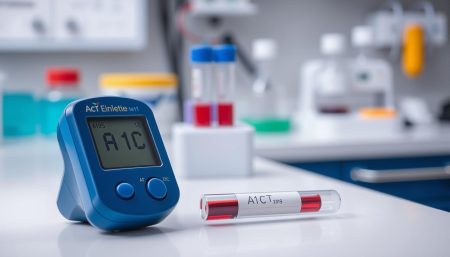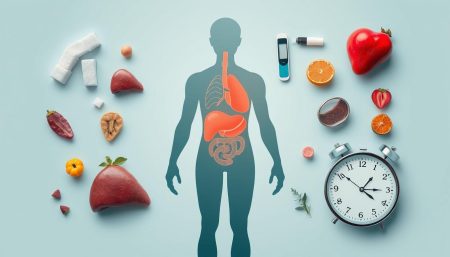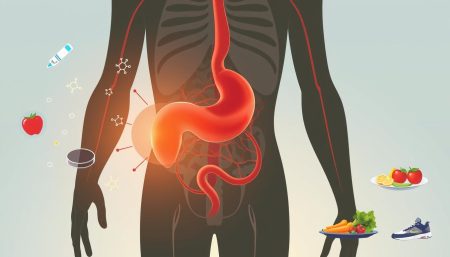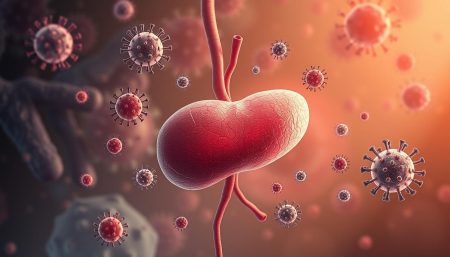Type 2 diabetes mellitus is a big challenge for public health worldwide. It causes high blood sugar and insulin resistance. This guide is here to help you understand and manage it.
We want to give you the tools to handle type 2 diabetes. Our goal is to empower you with the knowledge to live well with this condition.
We focus on the details of type 2 diabetes mellitus. It’s important to know how it works and its risks. This guide will walk you through symptoms, risk factors, and how to manage it.
We’ll cover the latest medical news and how to make lifestyle changes. Our goal is to help you live a balanced life with diabetes.
The Fundamentals of Type 2 Diabetes Mellitus
Type 2 diabetes mellitus is a metabolic disorder with high blood sugar and insulin resistance. It also means the pancreas can’t make enough insulin. Knowing how the body handles glucose is important to understand the problems it causes.
The body turns food into glucose, a sugar, which goes into the bloodstream. The pancreas then makes insulin to help glucose get into cells for energy. But, with insulin resistance, cells don’t use insulin well. This makes the pancreas work harder, leading to high blood sugar, or hyperglycemia.
High blood sugar can harm the heart, kidneys, nerves, and eyes. It can really change someone’s life. So, controlling blood sugar is key to managing or preventing Type 2 diabetes mellitus.
- Understanding the role of the pancreas in insulin production.
- Recognizing signs of high blood sugar to take timely actions.
- Learning about the impact of insulin resistance on overall health.
To manage this condition well, you need a full plan. This includes changing your diet, staying active, and checking your blood sugar often. This helps stop the metabolic disorder from getting worse and causing more serious problems.
Identifying the Risk Factors of Type 2 Diabetes
Understanding diabetes risk factors is key to preventing type 2 diabetes. This part talks about genetic risks, lifestyle choices, and environmental factors that lead to diabetes.
Genetics are important, but diet and exercise also play big roles. The environment, like access to healthy food and safe places to exercise, also affects diabetes risk.
- Family history of diabetes
- Obesity or being overweight
- Physical inactivity
- Poor diet, high in processed foods and sugars
- Age, over 45 years old
- High blood pressure and cholesterol levels
Talking about and tackling these diabetes risk factors is vital. It’s important for those at risk and for doctors to catch diabetes early and prevent it.
Prevention means changing your lifestyle. This includes eating better, moving more, and checking your blood sugar often. Knowing about these factors is a big step in preventing and managing type 2 diabetes.
Spotting and dealing with risk factors early helps in using the best prevention methods. This can greatly lower the number of people with type 2 diabetes.
Distinguishing Type 2 Diabetes from Other Forms
It’s important to know the differences between type 2 diabetes, type 1 diabetes, and gestational diabetes. Each type has its own signs, causes, and ways to treat it.
Type 1 diabetes happens when the body attacks its own insulin-making cells. This usually starts in younger people. Type 2 diabetes often starts in adults over 45 because the body can’t use insulin well. Gestational diabetes happens in pregnancy and might go away after the baby is born, but it raises the risk of getting type 2 diabetes later.
- Type 1 diabetes – Immune system attacks insulin-producing cells.
- Type 2 diabetes – Insulin resistance and eventual decline in insulin production.
- Gestational diabetes – Develops during pregnancy and may resolve after childbirth.
| Characteristic | Type 1 Diabetes | Type 2 Diabetes | Gestational Diabetes |
|---|---|---|---|
| Primary Concern | Autoimmune destruction of cells | Insulin resistance | High blood glucose during pregnancy |
| Common Age of Onset | Childhood/Young adulthood | Adults over 45 | During pregnancy |
| Insulin Dependency | Yes | Initially managed with lifestyle changes, possibly leading to insulin dependency | Typically managed with diet, may require insulin or other medications |
Knowing the exact type of diabetes helps in creating the right treatment plan. This is key for better health outcomes. While type 1 diabetes and type 2 diabetes often involve insulin, gestational diabetes focuses on keeping blood sugar in check during pregnancy.
Type 2 Diabetes Mellitus: Signs and Symptoms to Watch For
It’s important to spot diabetes symptoms early to manage Type 2 Diabetes Mellitus well. Symptoms can sneak up on you, making them easy to miss. Catching them early helps avoid serious problems linked to high blood sugar.
Common Symptoms of Type 2 Diabetes Include:
- Increased thirst and dry mouth
- Frequent urination, even at night
- Unexplained weight changes
- Always feeling hungry
- Feeling tired and weak
- Blurred vision
- Slow healing of cuts and wounds
- Numbness or tingling in hands and feet
Hyperglycemia: High blood sugar, or hyperglycemia, shows up in different ways. Look out for:
- Severe thirst
- Dry, itchy skin
- More trips to the bathroom than usual
- Feeling drowsy or confused
- A sweet smell in your breath
Noticing these signs early can help you get medical help fast. This can prevent serious problems or emergencies.
| Symptoms | Regular Occurence | Associated with Hyperglycemia |
|---|---|---|
| Increased Thirst and Urination | Yes | Yes |
| Fatigue | Often | Sometimes |
| Fruity-Smelling Breath | No | Yes |
| Slow Wound Healing | Often | No |
| Blurred Vision | Sometimes | Yes |
Role of Insulin Resistance in Type 2 Diabetes
Insulin resistance is a big problem in type 2 diabetes. It’s when the body can’t manage insulin well. This makes it hard to control glucose, leading to metabolic syndrome and type 2 diabetes.
Explaining Insulin Resistance
Insulin resistance happens when cells don’t respond well to insulin. This makes it hard for glucose to get into cells. The pancreas then makes more insulin, which can cause health problems.
How Insulin Resistance Leads to Type 2 Diabetes
Insulin resistance can lead to type 2 diabetes if the body can’t make enough insulin. High glucose levels make cells even more resistant. This creates a cycle that worsens insulin resistance and increases the risk of metabolic syndrome.
Overcoming Insulin Resistance
- Maintaining a healthy weight
- Incorporating regular physical activity
- Adopting a balanced diet rich in fiber and low in processed sugars
- Monitoring metabolic health with regular check-ups
It’s possible to reverse insulin resistance with the right lifestyle changes. Eating well and exercising regularly are key. These habits improve insulin function and overall health, reducing metabolic syndrome risks.
| Strategy | Benefits |
|---|---|
| Regular Physical Activity | Increases insulin sensitivity, lowers blood glucose levels |
| Healthy Balanced Diet | Improves insulin function, maintains healthy weight |
| Weight Management | Reduces the burden on insulin production, lowers risk of metabolic syndrome |
Monitoring Blood Glucose Levels for Effective Management
Regular blood glucose monitoring is key in diabetes management. It helps people make smart choices about what they eat, how much they exercise, and their medication. There are many ways to monitor blood sugar, each suited for different needs.
Knowing when and how often to check blood sugar is as important as the method. Usually, people check their levels before meals and at night. But, they might need to check more often when they’re sick or if their medication changes.
There are many tools for blood glucose monitoring, from finger-prick tests to continuous glucose monitors (CGMs). CGMs give real-time data and trends, helping to adjust treatment plans fast.
Learning about how diabetes affects health, like hair loss, is also important. Keeping blood sugar in check can prevent these issues. For more on diabetes and hair loss, check out this article.
By sticking to blood glucose monitoring, people with diabetes can stay healthy and avoid serious problems. It’s a vital part of managing the condition.
Healthy Eating Habits for Managing Type 2 Diabetes Mellitus
Healthy eating is key to managing Type 2 diabetes. A good diabetic diet helps control blood sugar and boosts overall health. Knowing how different foods affect blood sugar is important for making smart diet choices.
Designing a Diabetic-Friendly Diet
To create a diet for diabetes, focus on a mix of nutrients. Include proteins, fats, and carbs, with a preference for complex carbs and fiber. These foods raise blood sugar levels less.
Understanding Carbohydrates and Glycemic Index
Carbs greatly affect blood sugar and are a main focus in a diabetic diet. Foods are ranked by their glycemic index (GI). Foods with a low to medium GI help keep blood sugar stable.
Importance of Fiber and Whole Grains
Adding whole grains and high-fiber foods to your diet is beneficial. They improve heart health, digestion, and blood sugar control. Whole wheat, brown rice, and oats are great options that also help you feel full and manage weight.
Meal Planning and Portion Control
Meal planning and portion control are essential for diabetes management. Eating at set times and controlling portions keeps blood sugar steady. Consistency and moderation are key to a successful diet.
By choosing nutritious foods and understanding a diabetic diet, people with Type 2 diabetes can enjoy many foods. It’s about quality and balance, not restriction. This approach improves health and well-being.
Integrating Exercise into Your Diabetes Management Plan
Regular physical activity is key to managing Type 2 diabetes well. Doing exercise for diabetes improves blood sugar control and lowers heart disease risks. It also boosts overall health. Adding diabetes and physical activity to your daily life can change how you manage diabetes.

Starting to add exercise to your diabetes plan means knowing which activities help control blood sugar. Aerobic, strength, flexibility, and balance exercises are all good. Here’s a simple guide to get you started:
- Aerobic Exercise: Walking, swimming, and cycling raise your heart rate and make your body more sensitive to insulin. Try to do at least 150 minutes a week.
- Strength Training: Using resistance bands, free weights, or your body weight builds muscle. This is key for glucose use.
- Flexibility Exercises: Yoga or simple stretches improve muscle and joint health. They’re great for staying mobile.
- Balance Activities: Tai Chi and similar practices boost coordination and prevent falls. They’re very important as you get older.
To fit exercise into your diabetes care, choose activities that match your fitness and health. Always talk to your doctor before starting new exercises. Remember, sticking to a routine is important. But be flexible to make changes when needed.
Diabetes and physical activity are essential, not optional, for managing diabetes. By making exercise for diabetes a priority, you can live a better life and manage your diabetes well.
Medications and Treatments for Blood Sugar Control
Managing type 2 diabetes requires a variety of treatments to keep blood sugar levels in check. It’s important to know how these treatments work and their possible side effects. This knowledge is key to a good diabetes care plan.
Diabetes medications help in different ways. They can make the body more sensitive to insulin, increase insulin production, or block the liver’s sugar production. Here’s a look at some common diabetes medications that help manage blood sugar:
- Metformin – Enhances insulin sensitivity and reduces glucose production in the liver.
- Sulfonylureas – Stimulates the pancreas to produce more insulin.
- DPP-4 inhibitors – Helps reduce blood sugar levels without causing significant weight gain.
- GLP-1 receptor agonists – Mimic the action of a hormone that lowers post-meal blood sugar levels.
- SGLT2 inhibitors – Helps the kidneys remove glucose from the bloodstream through urine.
These medications are good at managing diabetes, but they can have side effects. These might include weight gain, stomach problems, or low blood sugar. It’s important for healthcare providers to watch for these issues. Other factors like health conditions, medication costs, and personal preferences also affect the choice of medication.
| Medication Type | Primary Action | Common Side Effects |
|---|---|---|
| Metformin | Decreases hepatic glucose production | Nausea, diarrhea |
| Sulfonylureas | Increases insulin secretion | Weight gain, hypoglycemia |
| DPP-4 Inhibitors | Improves incretin levels | Headache, sore throat |
| GLP-1 Receptor Agonists | Enhances glucose-dependent insulin secretion | Gastrointestinal distress |
| SGLT2 Inhibitors | Excretes glucose through urine | Urinary tract infections, dizziness |
Choosing the right treatment for diabetes is a team effort. Patients and healthcare teams work together to find the best medication. This ensures the benefits of the treatment outweigh the risks.
Diagnosing Type 2 Diabetes Mellitus and Medical Tests Involved
Understanding the tests needed for a diabetes diagnosis is key for early treatment. The glucose tolerance test is a major tool in this process.
Diagnosing diabetes starts with noticing symptoms or risk factors. Doctors then use several tests to confirm the diagnosis:
- Fasting Plasma Glucose (FPG) Test
- Oral Glucose Tolerance Test (OGTT)
- Hemoglobin A1C Test
The Oral Glucose Tolerance Test is critical for type 2 diabetes diagnosis. It checks how well the body handles glucose after drinking a sugary drink. Here’s how it works:
| Time | Procedure | Normal Glucose Levels (mg/dL) | Diabetic Glucose Levels (mg/dL) |
|---|---|---|---|
| 0 hours (Fasting) | Patient consumes sweetened drink containing 75g of glucose | < 100 | ≥ 126 |
| 2 hours | Blood glucose level measured again | < 140 | ≥ 200 |
Diagnosing diabetes requires more than one test. A single test result needs to be confirmed on another day to ensure accuracy.
In short, a quick diabetes diagnosis is vital. It helps prevent serious health issues and manage the disease well. Early detection and treatment through tests like the glucose tolerance test are essential.
Preventing Complications and Managing Co-Morbidities
Managing type 2 diabetes is more than just keeping blood sugar in check. It’s also about watching out for complications and dealing with other health issues. By taking a full approach to prevention and management, people can protect their health and live better lives.
Preventing Diabetic Cardiovascular Disease
Heart disease is a big worry for those with diabetes. To avoid heart problems, it’s key to keep blood sugar levels under control. Regular exercise and a healthy diet are also important. Plus, getting your blood pressure and cholesterol checked often is a must.
Managing Diabetes-Related Kidney Problems
Kidney damage from diabetes is serious. To stop it, get regular tests for microalbuminuria. Keep your blood pressure in check and use medicines that help your kidneys. Also, managing your blood sugar is critical.
Diabetes and Eye Health
Eye problems like retinopathy are common in people with diabetes. To fight this, get an eye exam every year. Keeping your blood sugar levels right can also help prevent serious eye diseases.
Navigating Diabetes and Mental Health
Diabetes can affect your mind as much as your body. It’s important to manage stress through mindfulness or counseling. Support groups can also help improve your mental health.
| Complication | Preventative Measures | Management Strategies |
|---|---|---|
| Cardiovascular Disease | Regular exercise, healthy diet, monitoring cholesterol | Medications for blood pressure and cholesterol, lifestyle adjustments |
| Kidney Disease | Screening for microalbuminuria, control blood pressure | Use of ACE inhibitors or ARBs, maintain glycemic control |
| Eye Health | Annual eye exams, control of blood sugar | Treatment of existing conditions, laser therapy |
| Mental Health | Mindfulness, stress management education | Counseling, participation in support groups |
Emerging Research and Future Treatments for Type 2 Diabetes
In the field of diabetes research, big steps are being taken towards new treatments for Type 2 diabetes. This section looks at the most promising studies and therapies that could soon be used in clinics.
One exciting area is the development of insulin that changes its activity based on blood sugar levels. This could make managing diabetes easier by automatically adjusting insulin doses. It could also lower the chance of blood sugar dropping too low.
- Enhanced Beta-cell Replacement Therapies
- Artificial Pancreas Developments
- Advances in Gene Editing Techniques
There are also new ways to treat diabetes, like precision medicine. This method creates treatment plans based on a person’s genes and lifestyle. It aims to make treatments work better and have fewer side effects.
| Research Focus | Goal | Potential Impact |
|---|---|---|
| Glucose-responsive insulin | Automate insulin delivery | Reduce risk of hypoglycemia |
| Gene therapy for beta cells | Restore insulin production | Minimize or eliminate need for insulin injections |
Diabetes research is not just about finding new treatments. It also looks into how to prevent Type 2 diabetes. By understanding more about the disease, scientists hope to create even better treatments.

There’s also excitement about using nanotechnology for new ways to deliver drugs and monitor blood sugar. These technologies could give patients real-time information about their blood sugar without needing to take blood samples.
The future for people with Type 2 diabetes is looking brighter. Thanks to ongoing research and new treatments, the goal is to improve their quality of life and outcomes.
Implementing Diabetes Prevention Strategies
In the fight against Type 2 diabetes, lifestyle interventions are key. They help reduce diabetes risk. By making healthy choices, you can prevent this disease. This includes eating right, staying active, and managing your weight.
- Nutritional Adjustments: Eating well is essential. Choose foods rich in nutrients but low in saturated fats. Include non-starchy veggies, whole grains, lean proteins, and fruits in your diet.
- Regular Physical Activity: Exercise is vital. It helps control weight and boosts insulin sensitivity. Aim for 150 minutes of moderate activity like brisk walking or cycling weekly.
- Weight Management: Keeping a healthy weight is critical. Losing 5% to 10% of your body weight can greatly lower diabetes risk.
- Regular Health Screenings: Regular check-ups are important. They help catch pre-diabetic conditions early. Get an annual blood glucose test if you’re at risk.
By adopting these lifestyle changes, you can significantly lower your risk of Type 2 diabetes. Starting early not only reduces diabetes risk but also improves your overall health and wellbeing.
Living with Type 2 Diabetes Mellitus: Lifestyle Adjustments and Support
Starting life with diabetes means making big changes to manage it well. For those with Type 2 Diabetes Mellitus, sticking to a routine is key. This includes checking blood sugar often, taking medicines as directed, and eating a balanced diet.
It’s not just about controlling sugar levels. It’s about making these habits a part of a healthy lifestyle. This way, you can feel good and live well too.
Getting support is vital for managing diabetes long-term. Having doctors, friends, and family who get it makes a big difference. Also, sites like Healthwith.com offer helpful tips and advice. This support helps you feel empowered and in control of your health.
But it’s not just about those close to you. Community programs and resources are also key. There are fitness classes and cooking workshops made just for diabetics. These opportunities help you learn and grow, making life with diabetes more manageable.
FAQ
Q: What is Type 2 Diabetes Mellitus?
A: Type 2 Diabetes Mellitus is a long-term condition. It causes high blood sugar and insulin resistance. Managing it well is key to avoid serious problems.
Q: How does the body process glucose normally, and what happens in insulin resistance?
A: Normally, insulin helps the body use glucose for energy. In insulin resistance, cells don’t respond well to insulin. This leads to high blood sugar levels.
Q: What are the risk factors for developing Type 2 Diabetes?
A: Risk factors include genetics, lifestyle, health conditions, and environment. Spotting these risks early is important for prevention and treatment.
Q: How is Type 2 Diabetes different from Type 1 Diabetes and Gestational Diabetes?
A: Type 2 Diabetes is linked to lifestyle and obesity. It’s caused by insulin resistance. Type 1 Diabetes is an autoimmune disease. Gestational Diabetes happens during pregnancy and usually goes away after giving birth.
Q: What are the common signs and symptoms of Type 2 Diabetes?
A: Signs include increased thirst, frequent urination, fatigue, blurred vision, slow-healing sores, and unexplained weight loss.
Q: Why is insulin resistance central to the development of Type 2 Diabetes?
A: Insulin resistance is key because it stops the body from using insulin well. This leads to high blood sugar and diabetes.
Q: How important is monitoring blood glucose levels in managing Type 2 Diabetes?
A: Monitoring blood glucose is critical. It helps adjust medication and diet to keep blood sugar in check.
Q: What constitutes a diabetic-friendly diet?
A: A diabetic diet includes balanced meals with controlled carbs. It focuses on high-fiber foods and low glycemic index choices. Regular meals help keep blood sugar stable.
Q: How important is exercise in managing Type 2 Diabetes?
A: Exercise is essential. It boosts insulin sensitivity, controls blood sugar, and helps maintain a healthy weight.
Q: What are the common medications and treatments for Type 2 Diabetes?
A: Treatments include metformin, sulfonylureas, insulin, and newer drugs like GLP-1 receptor agonists and SGLT2 inhibitors.
Q: How is Type 2 Diabetes diagnosed?
A: Diagnosis involves fasting blood glucose tests, the A1C test, and the oral glucose tolerance test (OGTT).
Q: How can diabetic complications be prevented?
A: Prevent complications by controlling blood sugar, making healthy lifestyle choices, and managing related health issues.
Q: What new treatments are on the horizon for Type 2 Diabetes?
A: New treatments include novel insulins, drugs targeting the immune system and metabolism, and advanced glucose monitoring and delivery technologies.
Q: What lifestyle interventions can help prevent Type 2 Diabetes?
A: Prevent Type 2 Diabetes with healthy eating, regular exercise, maintaining a healthy weight, managing stress, and avoiding smoking.
Q: What support and lifestyle adjustments are necessary for living with Type 2 Diabetes?
A: Living with Type 2 Diabetes requires monitoring, medication adherence, dietary changes, exercise, and support from healthcare and support groups.


















